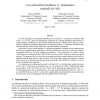507 search results - page 51 / 102 » The relation between protocols and games |
126
click to vote
SAGT
2010
Springer
14 years 11 months ago
2010
Springer
The PPAD-completeness of Nash equilibrium computation is taken as evidence that the problem is computationally hard in the worst case. This evidence is necessarily rather weak, in ...
108
Voted
CORR
2007
Springer
15 years 16 days ago
2007
Springer
Discrete temporal transitions occur in a variety of domains, but this work is mainly motivated by applications in molecular biology: explaining and analyzing observed transcriptome...
STOC
2007
ACM
16 years 26 days ago
2007
ACM
A zero-knowledge proof allows a prover to convince a verifier of an assertion without revealing any further information beyond the fact that the assertion is true. Secure multipar...
106
Voted
STOC
2007
ACM
16 years 26 days ago
2007
ACM
In 1998, Impagliazzo and Wigderson [IW98] proved a hardness vs. randomness tradeoff for BPP in the uniform setting, which was subsequently extended to give optimal tradeoffs for t...
FOCS
2010
IEEE
14 years 10 months ago
2010
IEEE
We study differential privacy in a distributed setting where two parties would like to perform analysis of their joint data while preserving privacy for both datasets. Our results ...


